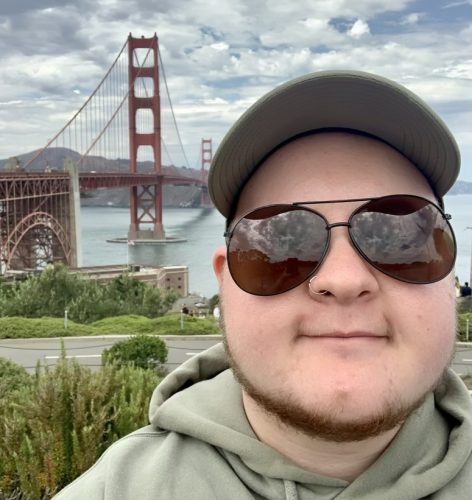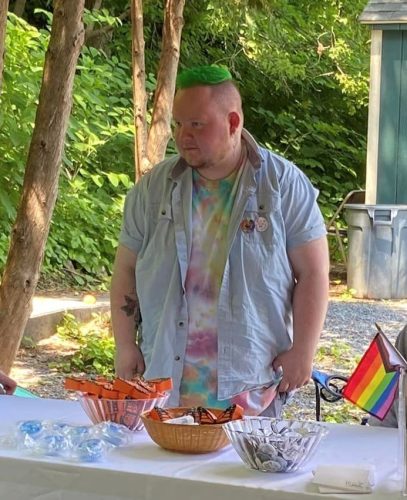Owen Virgilio, Progressive Steps Apartment Program (PSAP) Counselor, shares his story of being a transman and how prejudices against LBGTQ+ individuals affect his mental health.

I am open and proud to be a transman, but the prejudices we in the LBGTQ+ community face have affected my mental health. In the past I’ve faced prejudices at jobs, in school, and from people outside the community. At some of my past jobs, I have had coworkers aggressively use wrong pronouns, ask uncomfortable questions, and purposely use the wrong name instead of calling me by my chosen name. Overcoming this type of oppression has made me stronger, but at the time it made me feel anxious and depressed.
I overcame anxiety and depression with the support of others.
I overcame my anxiety and depression through the support from my girlfriend, people at LBGTQ+ support groups, and my friends – who are all a mix of different identities. They all have helped me work through the anxiety and depression and gain confidence in who I am. My girlfriend is also a part of the LGBTQ+ community, so she can relate to me and always makes me feel very loved and accepted. A good support system can make all the difference in overcoming mental health struggles.

I have the support of my family members too – each family member I have offers support in different ways. Even though not all are accepting and not all use my correct name and pronouns, the support of the family members who do respect my name and pronouns helps me gain confidence. It is extremely important to have family support, but for those who unfortunately do not have the support of their families or friends, the LGBTQ+ support groups are amazing resources
The anti-trans laws affect the mental health of many trans people.
The anti-trans laws also affect my mental health and the mental health of many trans people. I did my research project on trans laws and allostatic overload – the cumulative burden of chronic stress and life events that often results in physical ailments. The stress of the prejudice that result from anti-trans laws often leads to allostatic overload, causing a variety of not only mental health but physical health ailments and concerns.
Thus, LGBTQ+ support groups and social groups are very important. It is great to have to have a place to feel supported and to socialize with other like-minded people. These groups give so many people the words to use for identities and they provide a space where people can relate to others who go through the same experiences as themselves. I go to and support local LGBTQ+ businesses like Café Euphoria – a trans owned coffee shop and thrift store. It is a safe space to hang out and socialize. They have support groups where they partner with the Albany Pride Center, and they provide healthy food to LGBTQ+ people in need on a sliding scale. I also would like to volunteer at the Pride center in Albany or Saratoga as my schedule allows. I did volunteer to table for RISE at the recent Saratoga Pride event.
Pride events help create acceptance and provide education.
During Pride month and through the year, I attend Pride events. These community events and gatherings are important because not only do they provide a safe place for people to celebrate their individual identities, they also help create acceptance and provide education amongst the general public.

I’ve been working at RISE for almost a year. It is a nice place to work. Everyone is super supportive, and I feel comfortable being myself here. The PSAP team is accepting, and I am judged only on my work and my counseling skills. I don’t announce to others that I am trans, but I have a testosterone molecule tattoo on my arm with my Hormone Replacement Therapy start date on it which has come up in conversations and leads me to sharing that I am trans. I have found that everyone that I’ve told here at RISE is very accepting. It is a great culture that is fostered here, and I am glad to be a part of it. It is also great that RISE is developing so many new programs to help others in the community.
I use all that I have overcome to help others with their struggles.
I am very empathic when working with residents. I use all that I have overcome to help them with their struggles – no matter what they are going through. I do, however, enjoy helping others who share their LGBTQ+ identities. I use neutral language when approaching others and don’t make assumptions about them or their pronouns. I reflect the language the clients use about themselves until they feel comfortable sharing their identity with me. I only identify myself as trans during meetings with clients if it is important and comes up in conversation, which it has not yet.

I enjoy helping others and this is the field to do that. I am very interested in psychology and eventually I would like to become a therapist and/or a researcher. I have a bachelor’s degree in psychology with a minor in LGBTQ+ studies. I plan to continue my education and would like to apply to Clinical Psychology PhD programs. I am hopeful that I can do so locally and get accepted to the PhD program at UAlbany. I enjoyed being a Research Assistant in the Imagination Lab during my time at UAlbany and I have had great experiences with the professors there. I enjoy doing research because it helps people – the more we know the more we can help people out and research helps people bring more knowledge. Knowledge that can help other LGBTQ+ people like me overcome anxiety, depression, and other mental health concerns that should not be concerns just for being who we are.
